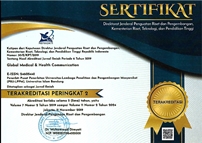Effect of Gratitude, Forgiveness, and Social Support on Retiree Well-being with Self-efficacy as a Mediator Variable
Abstract
Many psychological problems arise when facing retirement due to unpreparedness during this period. Unpreparedness is commonly triggered by their fears of being unable to meet primary and secondary needs. Physical issues such as retirement health are essential, but paying attention to psychological problems is also necessary. Research on the well-being of retirees needs to be done to see what factors influence both internally and externally. This study aims to test the retirement well-being model in terms of such aspects as gratitude, forgiveness, and social support mediated by self-efficacy. This study used the structure equation model (SEM) approach with a sample of 220 retirees aged at least 55 through a convenience sampling technique. The data was collected in Bandung and its surroundings for six months, from August 2019 to March 2020, through well-being, gratitude, forgiveness, social support, and self-efficacy scales. The results of the research model tested have a good fit with empirical data and meet the goodness of fit requirements. There is a direct influence of gratitude, social support, and self-efficacy on well-being. There is an indirect effect of social support on well-being through self-efficacy. The value of the indirect effect is smaller than the direct effect, meaning that self-efficacy is not a good mediator variable for social support for well-being. In conclusion, most retirees experience well-being due to social support from their environment and their gratitude and self-efficacy. The well-being of retirees can be increased by appreciation, having social support from the environment, and having confidence in one's ability to deal with problems.
Keywords
Full Text:
PDFReferences
Wang M, Shi J. Psychological research on retirement. Annu Rev Psychol. 2014;65:209–33.
Osborne JW. Psychological effects of the transition to retirement. Can J Couns Psychother. 2012;46(1):45–58.
Diener E, Oishi S, Lucas RE. Personality, culture, and subjective well-being: emotional and cognitive evaluations of life. Annu Rev Psychol. 2003;54:403–25.
Compton WC. An introduction to positive psychology. San Francisco: Thomson Wadsworth; 2005.
Park N, Peterson C, Seligman MEP. Strengths of character and well-being. J Soc Clin Psychol. 2004;23(5):603–19.
Watkins PC, Woodward K, Stone T, Kolts RL. Gratitude and happiness: development of a measure of gratitude and relationships with subjective well-being. Soc Behav Pers. 2003;31(5):431–52.
Worthington EL Jr, Wade NG. Handbook of forgiveness. 2nd Edition. New York: Routledge; 2020.
Cohen S, Underwood LG, Gottlieb BH. Social support measurement and intervention: a guide for health and social scientists. Oxford: Oxford University Press; 2000.
Sarafino EP. Applied behavior analysis: principles and procedures in behavior modification. Hoboken: John Wiley & Sons; 2012.
Dingemans E, Henkens K. How do retirement dynamics influence mental wellbeing in later life? A 10-year panel study. Scand J Work Environ Health. 2015;41(1):16–23.
Loton DJ, Waters LE. The mediating effect of self-efficacy in the connections between strength-based parenting, happiness and psychological distress in teens. Front Psychol. 2017;8:1707.
Karademas EC. Self-efficacy, social support, and well-being: the mediating role of optimism. Pers Individ Dif. 2006;40(6):1281–90.
Neuman WL. Social research methods: qualitative and quantitative approaches. 7th Edition. Essex: Pearson Education Limited; 2014.
Butler J, Kern ML. The PERMA-Profiler: a brief multidimensional measure of flourishing. Int J Wellbeing. 2016;6(3):1–48.
Seligman MEP. Flourish: a visionary new understanding of happiness and well-being. New York: Atria; 2011.
Mccullough ME, Emmons RA, Tsang JA. The grateful disposition: a conceptual and empirical topography. J Pers Soc Psychol. 2002;82(1):112–27.
Thompson LY, Snyder CR, Hoffman L, Michael ST, Rasmussen HN, Billings LS, et al. Dispositional forgiveness of self, others, and situations. J Pers. 2005;73(2):313–59.
Bandura A, Freeman WH, Lightsey R. Self-efficacy: the exercise of control. J Cogn Psychother. 1999;13(2):158–66.
Strobel M, Tumasjan A, Spörrle M. Be yourself, believe in yourself, and be happy: self-efficacy as a mediator between personality factors and subjective well-being. Scand J Psychol. 2011;52(1):43–8.
Liu C, Cheng Y, Hsu ASC, Chen C, Liu J, Yu G. Optimism and self-efficacy mediate the association between shyness and subjective well-being among Chinese working adults. PLoS One. 2018;13(4):e0194559.
Chen Y, Feeley TH. Social support, social strain, loneliness, and well-being among older adults: an analysis of the health and retirement study. J Soc Pers Relat. 2014;31(2):141–61.
Lane JA, Fink RS. Attachment, social support satisfaction, and well-being during life transition in emerging adulthood. Couns Psychol. 2015;43(7):1034–58.
Steffens NK, Jetten J, Haslam C, Cruwys T, Haslam SA. Multiple social identities enhance health post-retirement because they are a basis for giving social support. Front Psychol. 2016;7:1519.
Wood AM, Froh JJ, Geraghty AWA. Gratitude and well-being: a review and theoretical integration. Clin Psychol Rev. 2010;30(7):890–905.
Chan DW. Gratitude, gratitude intervention, and subjective well-being among Chinese school teachers in Hong Kong. Educ Psychol. 2010;30(2):139–53.
Aghababaei N, Farahani H. The role of trait gratitude in predicting psychological and subjective well-being. J Dev Psychol. 2012;8(29):75–84.
Măirean C, Turliuc MN, Arghire D. The relationship between trait gratitude and psychological wellbeing in university students: the mediating role of affective state and the moderating role of state gratitude. J Happiness Stud. 2019;20(5):1359–77.
Diener E, Oishi S, Lucas RE. Subjective well-being: the science of happiness and life satisfaction. In: Snyder CR, Lopez SJ, editors. The Oxford handbook of positive psychology. 2nd Edition. Oxford: Oxford University Press; 2012. p. 187–94.
Scheidle LE. Forgiveness and gratitude as predictors of elderly subjective well-being [dissertation]. Virginia Beach: Regent University; 2010 [cited 2022 May 20]. Available from: https://www.proquest.com/openview/ded506be821ccaf127ca3dd1d3c205fc.
Liu HC, Wu MX. Relationship among forgiveness, interpersonal satisfaction and subjective wellbeing of college students. Chinese J Clin Psychol [Internet]. 2011;19(4):531–3.
Akhtar S, Dolan A, Barlow J. Understanding the relationship between state forgiveness and psychological wellbeing: a qualitative study. J Relig Health. 2017;56(2):450-463.
Nashori F, Iskandar TZ, Setiono K, Siswadi AGP, Andriansyah Y. Religiosity, interpersonal attachment, and forgiveness among the Javanese population in Yogyakarta, Indonesia. Ment Health Relig Cult. 2020;23(2):99–112.
DOI: https://doi.org/10.29313/gmhc.v11i2.12388
pISSN 2301-9123 | eISSN 2460-5441
Visitor since 19 October 2016:
Global Medical and Health Communication is licensed under a Creative Commons Attribution-NonCommercial-ShareAlike 4.0 International License.































.png)
_(1).png)
_(1).jpg)
